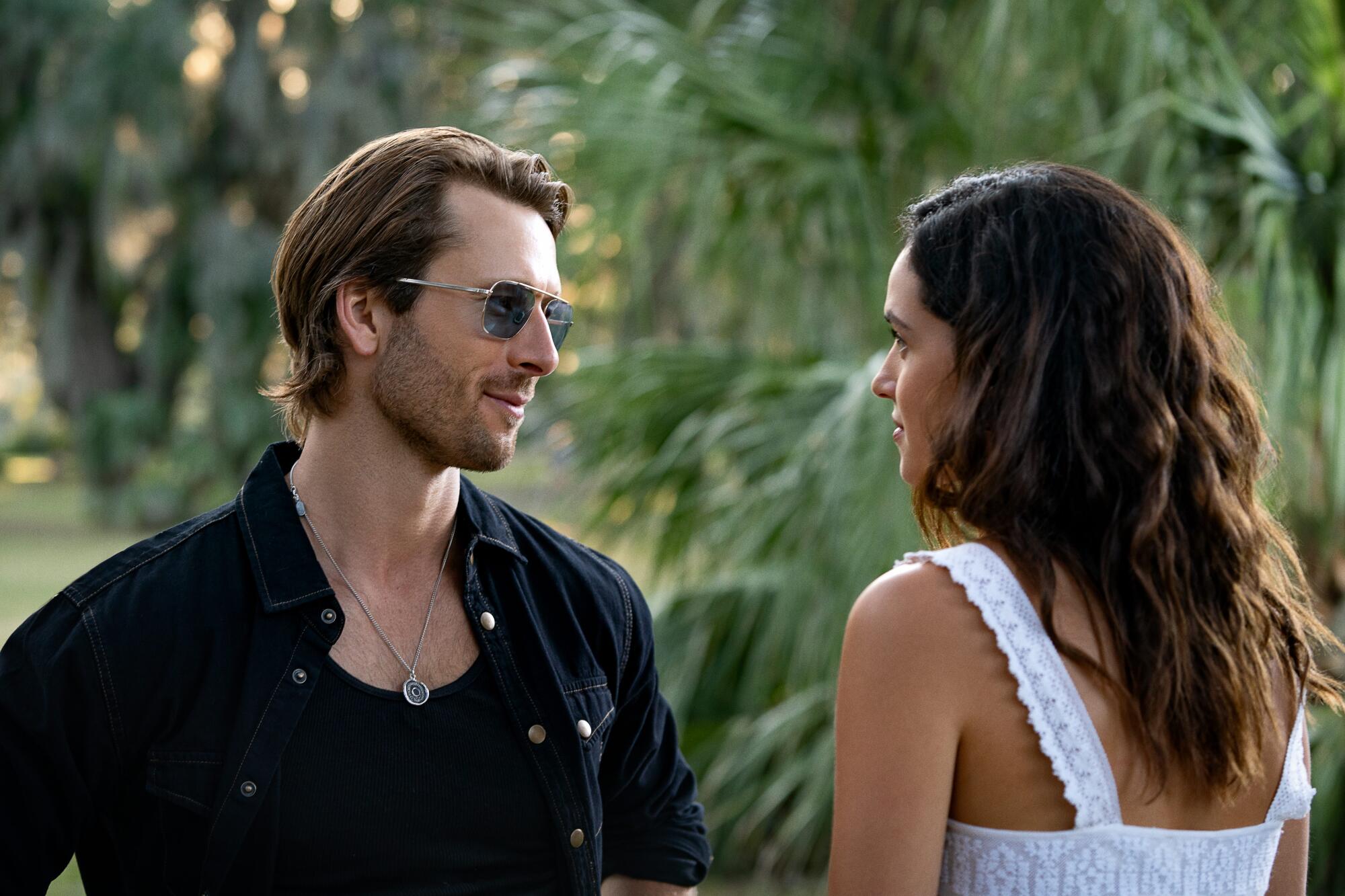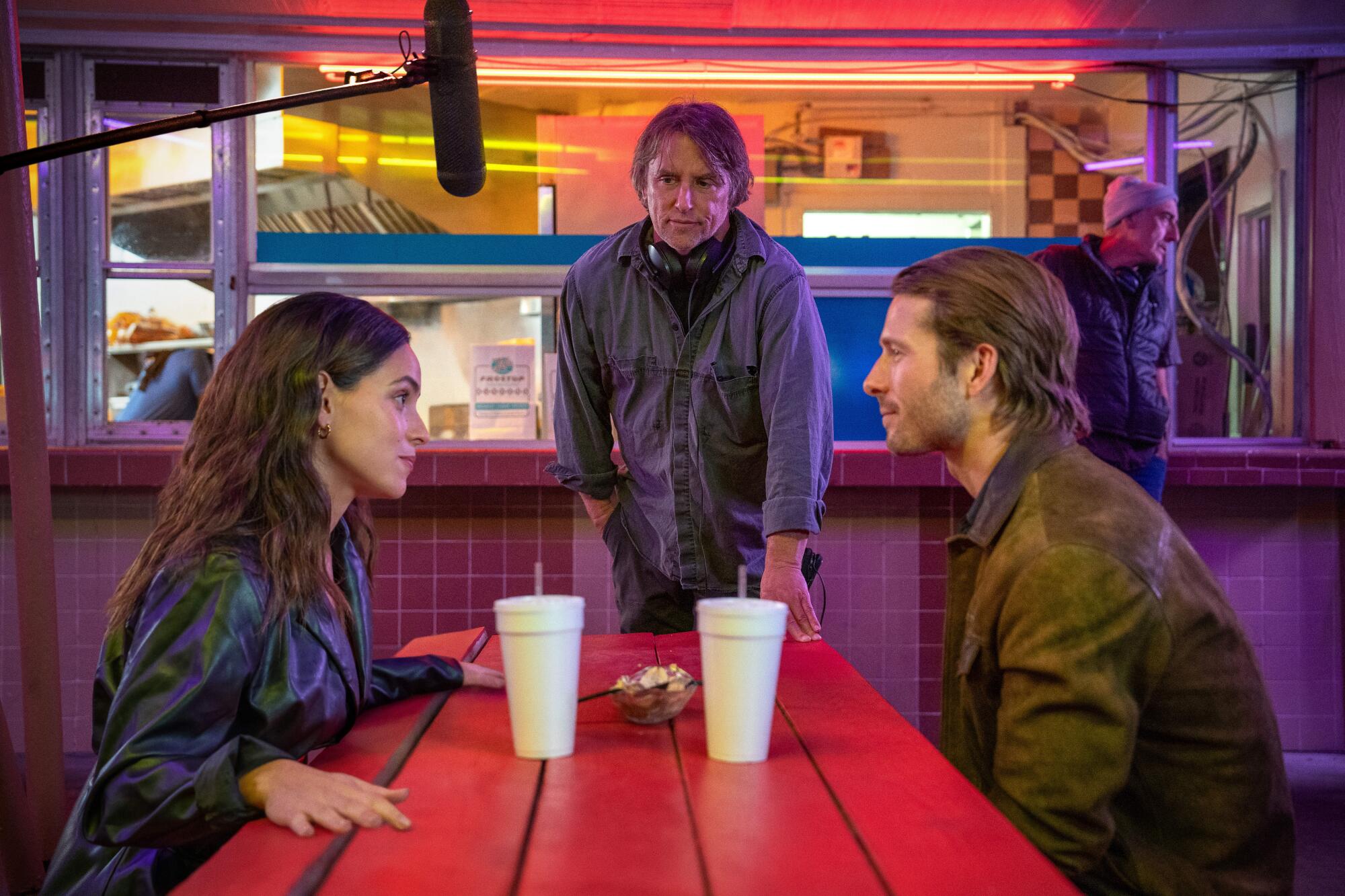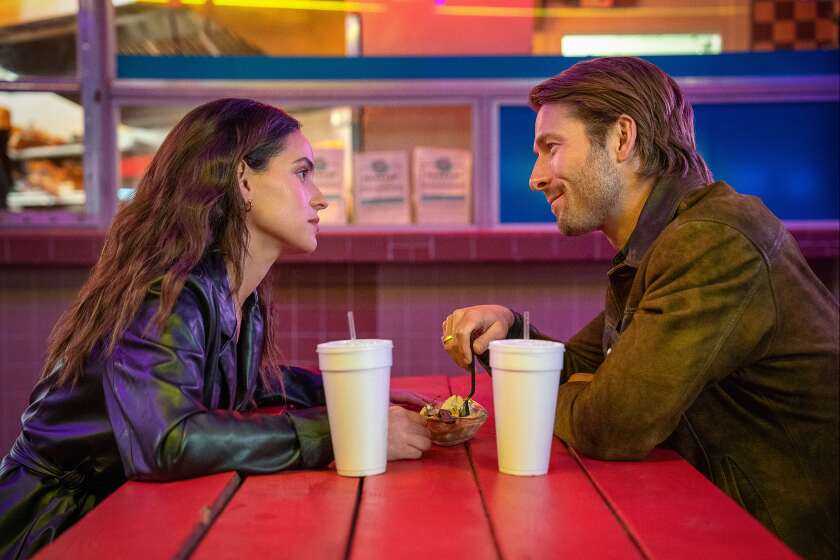
- Share via
In a career that now encompasses 22 features, director Richard Linklater has tackled myriad subjects and worlds: high school, Orson Welles, weirdos, lovers, ballplayers, boyhood. But until he made “Hit Man,” he’d never dabbled in the dark arts of contract killing — even if his meek main character is only pretending to be an elite assassin.
But what’s very real about this comedy-thriller-love story, which arrives on Netflix on Friday, is that it represents the director’s continued willingness to keep trying new things, to never settle on a fixed idea of the kinds of movies he makes. Never before has Linklater done a picture so awash in the pleasures of play-acting and sultry sex.
“For this story to work, it’s got to be sexy,” he says over Zoom from Austin, Texas. “It’s got to be hot sex — that’s what makes people do crazy, dangerous things. You can stay home alone in your room with your cats, and none of this will ever befall you — but if you step out and go into that world, you’re going to have to deal with those consequences. But it’s worth the risk. That’s the point of the movie: Still do that, err on that side, even if there’ll be a little body count at the end of it.”
Linklater, who turns 64 this summer, is a filmmaker who lives in the real world. His body of work accentuates the casual poetry of the everyday, his movies lauded for their breezy naturalness. Which is why it’s such a welcome surprise when he operates in a more fanciful vein. “Hit Man” is based on the unlikely true story of Gary Johnson, a mild-mannered college professor who assisted Houston law enforcement by posing as a contract killer, busting potential clients seeking his lethal services. In the movie, which is now set in New Orleans, Gary (played by Glen Powell of “Top Gun: Maverick” and December’s sleeper rom-com smash “Anyone but You”) discovers his alter ego is a handy way to reinvent himself, especially once he encounters Maddy (Adria Arjona), who hires him to bump off her ex-husband. Instantly smitten, Gary (who calls himself Ron) talks Maddy out of her reckless act so she won’t be arrested, but soon a combustible love affair ignites.

Based on a 2001 Texas Monthly profile by Skip Hollandsworth — the same journalist who reported the story behind Linklater’s 2011 small-town murder comedy “Bernie” — “Hit Man” takes major liberties in its portrayal of Johnson, who died in 2022. The film’s central romance and its twisty complications were dreamed up by the director and his co-writer Powell, an official Internet Boyfriend who makes a meal out of his character’s nerdy/hunky dichotomy. For Linklater, our fascination with hit men was key to telling this story.
“It’s crazy, the idea that you could just purchase the death of another human being so easily without repercussion,” he says. As for the fact that Gary suddenly becomes a suave, confident stud once he dons his contract-killer guise, Linklater attributes the allure to deep-seated ideas about masculinity: “It’s really just the macho, Western myth: the lone quick-draw killer. It’s male-fantasy s—.”
In the years since his Oscar-winning “Boyhood,” none of Linklater’s films have resonated in the culture as forcefully. But “Hit Man” has earned some of his most glowing recent reviews — particularly from those craving grown-up, witty rom-coms in the age of franchise fatigue. Linklater is pleased by the positive reaction, which began last year at the Venice Film Festival, but as someone who says he doesn’t read the trades or visit social media, the filmmaker doesn’t focus on whether his movies are hits.
“With ‘Dazed and Confused,’ my first studio experience, I made what I thought was a wildly entertaining, crowd-pleasing film,” he says, “only to see the studio think it wasn’t and put it out in a really indie sort of way. That set a template for my thinking: They usually mishandle things. ‘Everybody Wants Some!!’ is another example — that’s an entertaining-ass comedy. But they just never know what to do with these things.”
Starring Glen Powell and Adria Arjona, Richard Linklater’s “Hit Man” is a sexy, breezy, comedy-romance crime story that has more on its mind than first appears.
There’s no rancor in Linklater’s comment. Spend any time with the modest auteur and you’ll notice how egoless he is. (At the end of our interview, he announces, “I’m making it up like everybody else and everything I say is subject to change.”) His industry complaints are presented more as a shrug than a diatribe. “The bigger part of me, by far, is just grateful to get the film made and to be happy to have that experience,” he says. “You’re always releasing a film into who-knows-what culture, who-knows-what time, with uncertain distribution. I know this as a former athlete: Just do what you can control, do it well and keep doing it.”
Linklater is given to sports metaphors. He played football and baseball in high school, earning a baseball scholarship to Sam Houston State. (His underrated 2016 college-baseball comedy “Everybody Wants Some!!,” the film that helped raise Powell’s big-screen profile, draws inspiration from his time on the diamond.) But there’s one aspect of sports that doesn’t translate to cinema for him. “There’s a winner, there’s a loser,” he says. “What I love about art is, it’s not like that. It’s about self-perfection. I love trying to make the absolute best film you can. Get everyone together and just do your absolute best. If you can actualize that, that’s the magic.”
That unpretentious attitude has made Linklater the most approachable of American storytellers. He also embodies what feels like a long-gone American independent scene of the 1990s, back when there was a functioning movie economy that could support left-of-center projects like his breakout, “Slacker.”
But Linklater is quick to puncture that mythologizing. “I remember the reality and it was tough,” he insists. “It’s always tough. I don’t think there’s ever been an easy time in film. It’s always insecurity everywhere, it’s always people trying to get things made that aren’t getting made. It’s a struggle.”

Because of Linklater’s indie bona fides, some lamented that “Hit Man” was sold to Netflix, a company that often only offers cursory theatrical releases for its films. In fact, this is the director’s second straight project for Netflix, following his 2022 animated childhood reminiscence “Apollo 10 ½.” But although he avoids the online discourse, Linklater is aware that “Hit Man’s” most ardent supporters have been loudly carping that Netflix’s streaming-centric release strategy sabotages the movie’s most appealing quality, which is that it plays really well with an audience.
As with seemingly everything, Linklater is unperturbed.
“That just means they’re passionate about the film like we are and want people to see it and have a great experience in the theater,” he says about the movie’s social-media love. “But the petition isn’t to Netflix — it’s to the studios. You got to look at the industry and say, ‘Why did they see this film and not think it warranted a bigger theatrical release?’ Because someone could’ve fought for that.”
Asked if there were other potential buyers for “Hit Man” last fall during festival season, Linklater says, “There was some interest [from studios] — they didn’t rise to the Netflix level of passion. I don’t know, I’m not making the deal.”
As far as he’s concerned, he’s still working in the independent framework in which he’s regularly operated. “We were a total free-agent situation,” says Linklater. “Glen and I wrote this on spec. We did it ourselves — we got international financing. We were about as independent as you could get. We’re in theaters right now and doing really great. Many indie films are out of theaters in two weeks anyway. We’re getting an indie release. Let’s look at it like that.”
Our staffers select a highly opinionated list of their most anticipated titles: Hollywood fun machines, indie big swings and the truly unmissable.
When Linklater first read Hollandsworth’s article in 2001, Johnson’s double life instantly captured his imagination. But he had plenty already going on. That fall, he went to Venice to screen both his philosophical animated musing “Waking Life” and his gritty adaptation of Stephen Belber’s play “Tape.” “I was sort of on involuntary sabbatical from the bigger industry at that moment,” he recalls, with a laugh, “but I was getting these lower-budget things made.” While attending the Italian festival, he took meetings to pitch an ambitious idea he’d recently hatched: a 12-year saga about a boy growing up in Texas, filmed over 12 years. “‘Boyhood’ was, strangely, the one I had the least [trouble getting off the ground],” he tells me, “less than a year from idea to shooting.”
“Boyhood” was also a film that was shot in secret, which stands in stark contrast to Linklater’s current years-long endeavor, the big-screen adaptation of the 1981 Stephen Sondheim musical “Merrily We Roll Along,” which will span two decades of real-life shooting time and star Paul Mescal, Ben Platt and Beanie Feldstein.
Linklater doesn’t have the element of surprise this time, but he’s not sweating it. “I’m not one of those who encrypts my scripts,” he says. “I’m not superstitious — people ask me what I’m working on, I’ll probably tell them.”
Meanwhile, he’s also just finished shooting “Nouvelle Vague,” his portrait of a young Jean-Luc Godard (Guillaume Marbeck) making his epochal debut, “Breathless,” which reunites Linklater with “Everybody Wants Some!!” star Zoey Deutch, who plays the iconic, pixie-bobbed Jean Seberg. What has always driven him is an idea he can’t let go of, sometimes at the expense of what might be the “smarter” professional move. He remembers the industry doors that opened for him because “Dazed and Confused” was a hit.
“I could have made deals with everybody,” he recalls. Instead, he launched into “Before Sunrise” and the start of an unlikely and richly rewarding series of increasingly nuanced and poignant series of films with Ethan Hawke and Julie Delpy. “I had a lot of opportunity to go big time, had I wanted to. I turned down all that money for no money, no budget — I went to Vienna and made this film that I just felt I had to do next. You define yourself a lot by what you don’t do. In my case, career and money have never rated that highly.”
His unpredictable artistic journey continues — just don’t expect Linklater to proffer grandiose explanations for how it’s been sustained.
“I guess I had patience,” he says. “I didn’t need immediate gratification. I worked really diligently and had patience, because I knew it was a lifetime commitment. You don’t have to get it all immediately. Maybe early on, it does feel volatile — like it can all go away. But once you settle in, you think, ‘OK, I’m in this for the long run.’ Even though you might lose every battle, maybe you win your own little personal war along the way.”
He’s had his share of defeats, but “Hit Man” finds him victorious once again. Not that he’ll stop to savor it. There are other movies to make, other stories to tell. Merrily, he rolls along.
More to Read
Only good movies
Get the Indie Focus newsletter, Mark Olsen's weekly guide to the world of cinema.
You may occasionally receive promotional content from the Los Angeles Times.












